Popular Content
Want Email Updates?
Get emails about new stuff.
Be the first to know.
Looking for Something?
Theme Worksheets
The theme of a story is a message that the author is trying to express. The author does not explicitly state the theme. To discover the theme, the reader must make some deductions concerning events in the story.
Identifying the theme of a story can be challenging. Fortunately, as with all reading skills, practice makes perfect. These theme worksheets will help students achieve mastery of this essential reading skill. I recommend starting with the theme PowerPoint lesson posted below. Also, you may be interested in my advice on teaching theme.
Theme Lesson 1
Here is an animated PowerPoint slideshow teaching students about THEME in stories. It includes definitions, explanations, and examples. Also, there is a review activity at the end of it. This activity is a great way to start your unit on theme.

Theme Lesson 2
Here is another animated PowerPoint slideshow teaching students about literary theme. This is a revision of my first theme lesson. It includes the same definitions and explanations but NEW EXAMPLES. Also, there is a review activity at the end of it with NEW PRACTICE PROBLEMS.

Theme Worksheet 1
Are you looking for an engaging activity to help your students review or practice identifying themes in short stories? Good news! You've found one here. In this worksheet students will practice identifying themes in five short stories. Students will read each story, determine the theme, and explain their answers. Suggested reading level for this text: Grade 4-8.
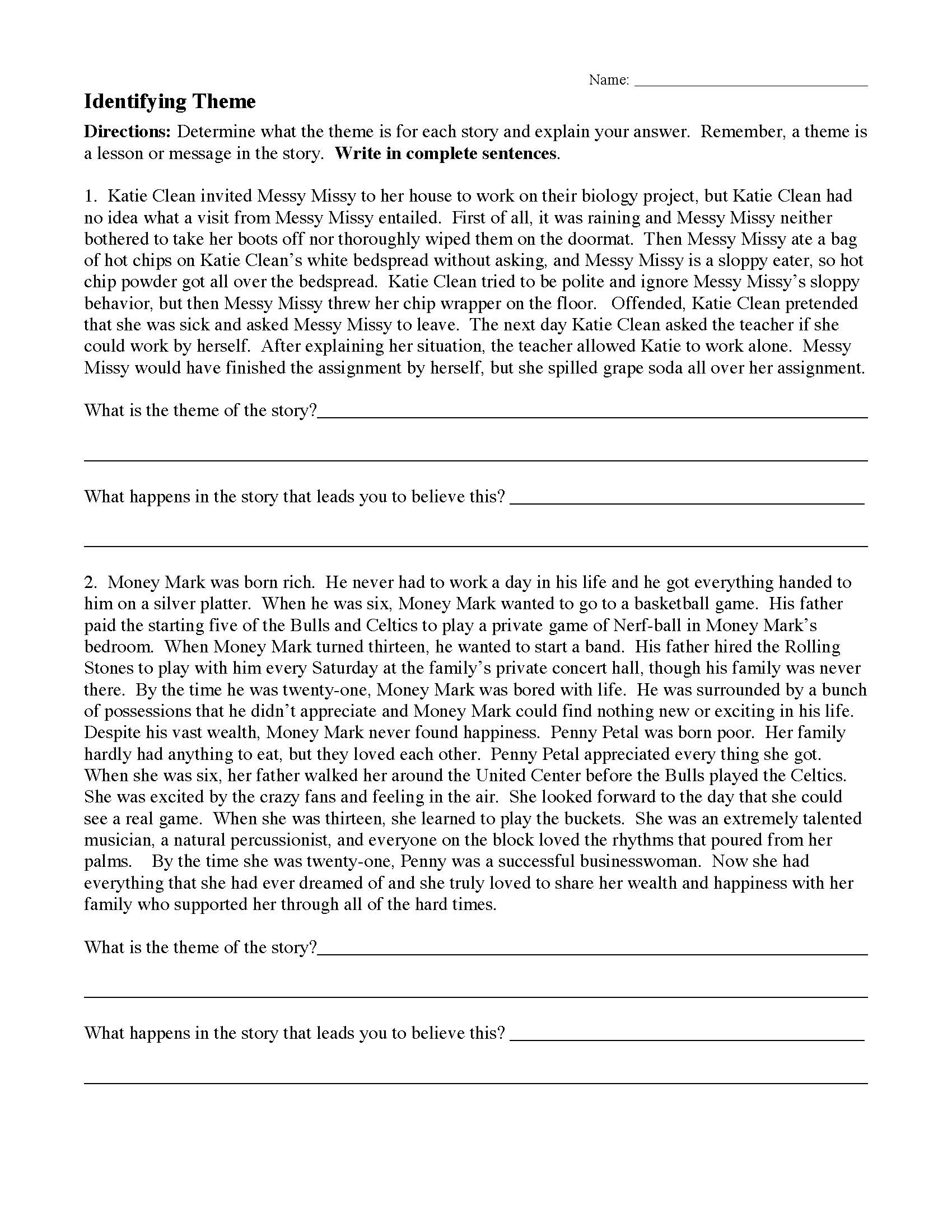
Theme Worksheet 2
Here's another engaging activity to help students practice identifying themes in short stories. In this worksheet students will read five original short story passages and determine the theme or message of the story. Also, they will explain how they got their answers. Suggested reading level for this text: Grade 4-8.
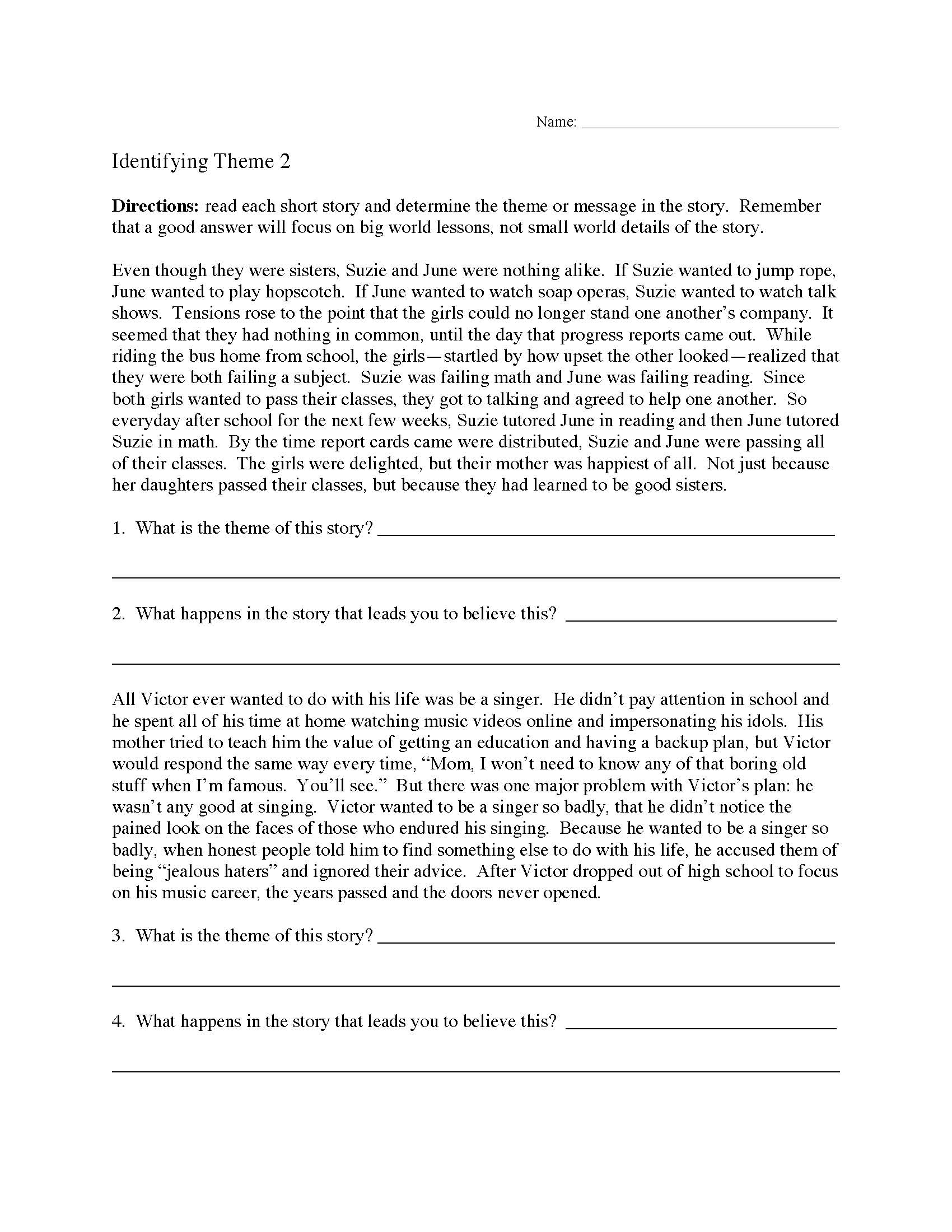
Theme Worksheet 3
Here's yet another theme worksheet to help your students master this challenging skill. Students read the short stories and extract the message. Then they support their answers with textual evidence. Suggested reading level for this text: Grade 4-8.
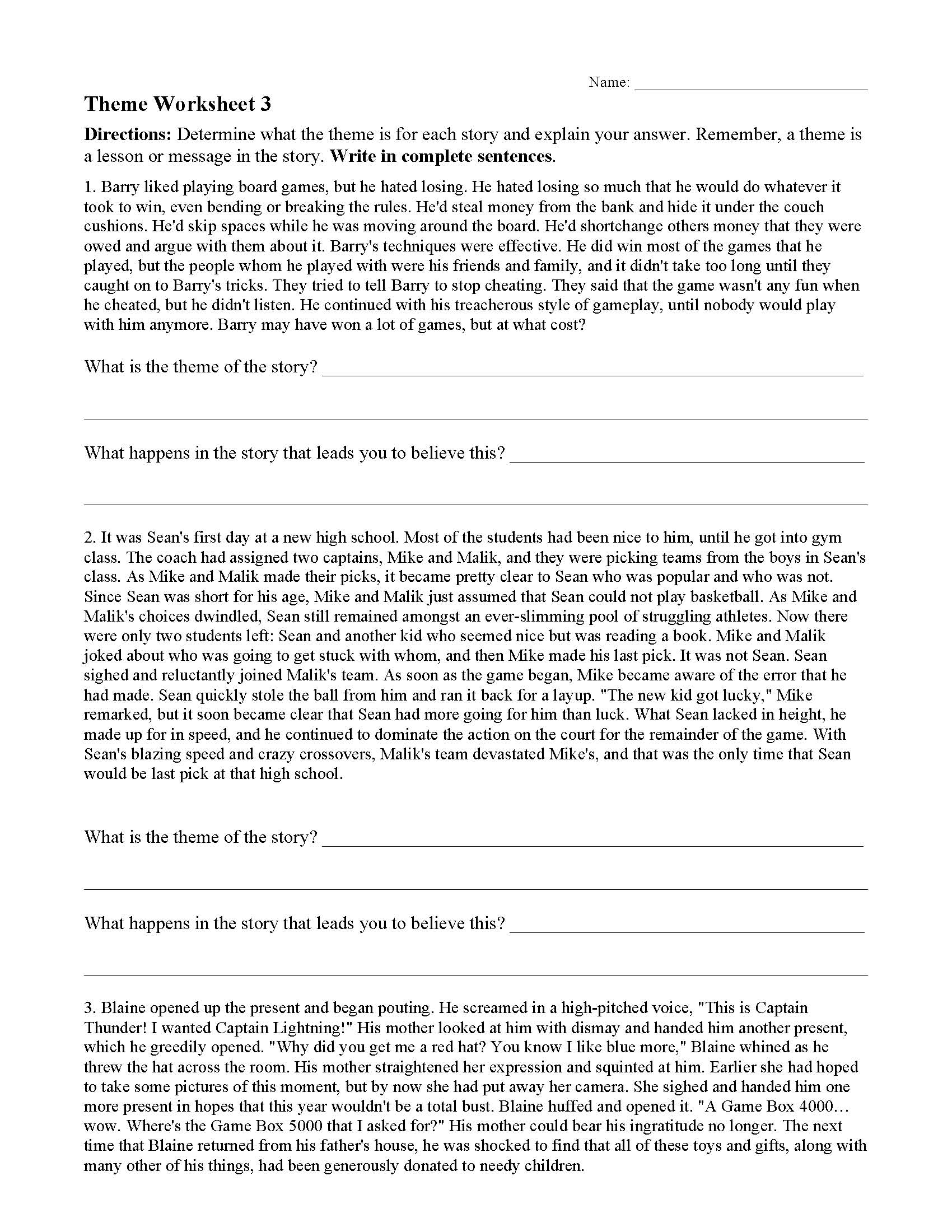
Theme Worksheet 4
Being able to identify the theme of a story is an important reading skill. Being able to support your answer with textual evidence is more important. This theme worksheet requires students to do both. Suggested reading level for this text: Grade 4-8.
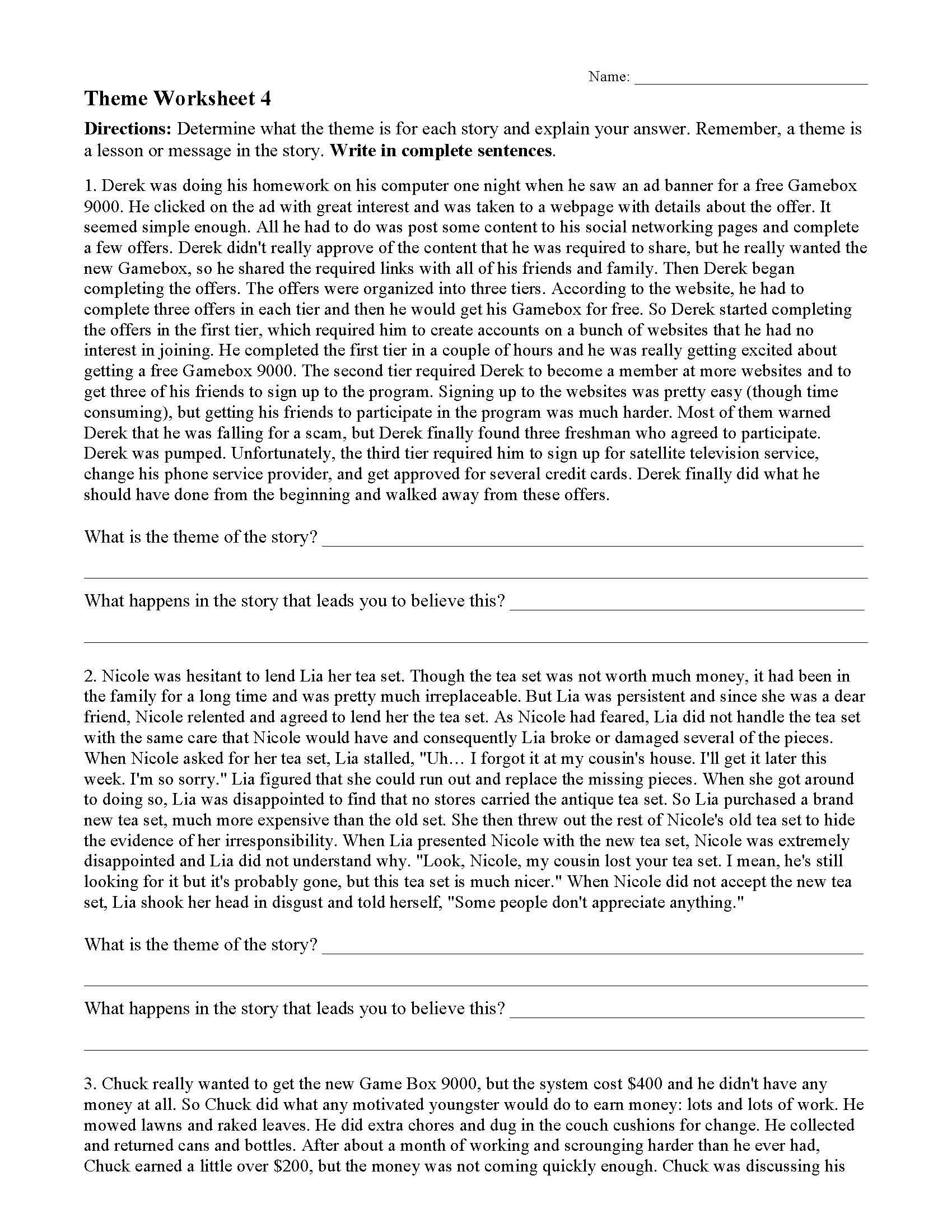
Theme Worksheet 5
Here is another double-sided theme worksheet. It has five passages from which students can extract a message. Students support their answers with textual evidence. Suggested reading level for this text: Grade 4-8.
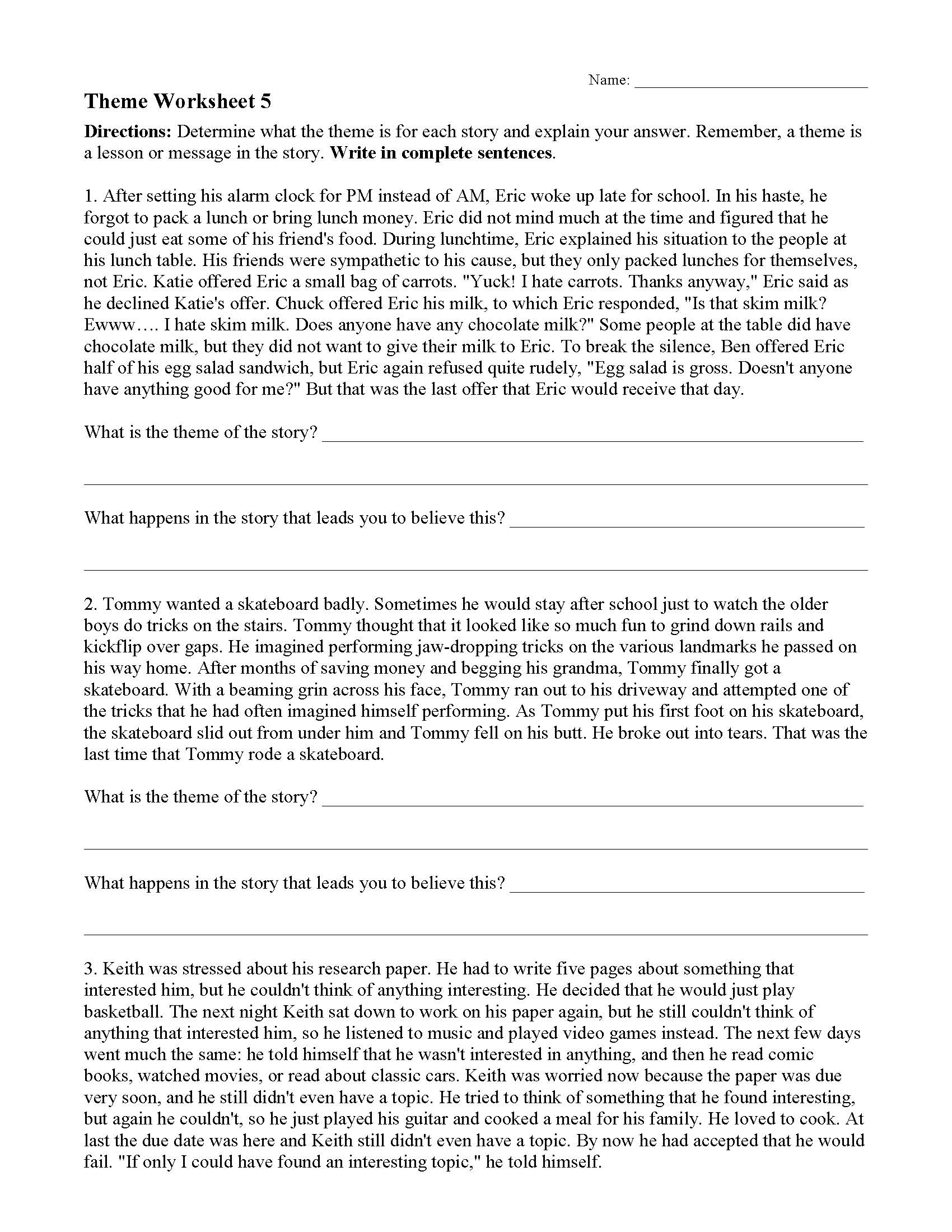
Theme Worksheet 6
This worksheet contains another five short stories to give students practice identifying themes. Students read the short stories, identify the themes, explain their answers using text. Suggested reading level for this text: Grade 5-9.
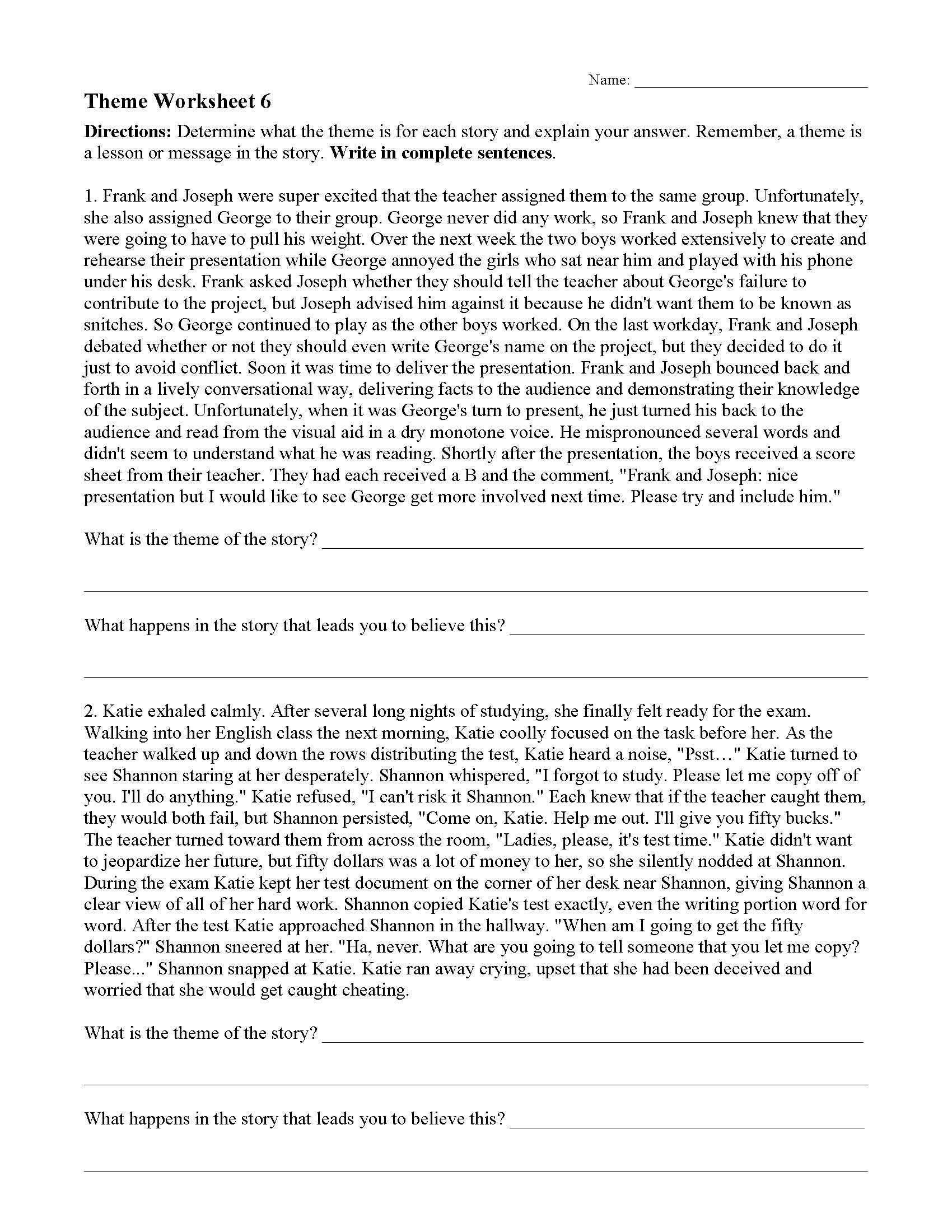
Theme Worksheet 7
This worksheet offers even more practice with identifying themes. Students read the short fiction passages and determine the life lesson of the story. They support their answers with textual evidence. These worksheets are aligned with Common Core State Standards. Suggested reading level for this text: Grade 4-8.
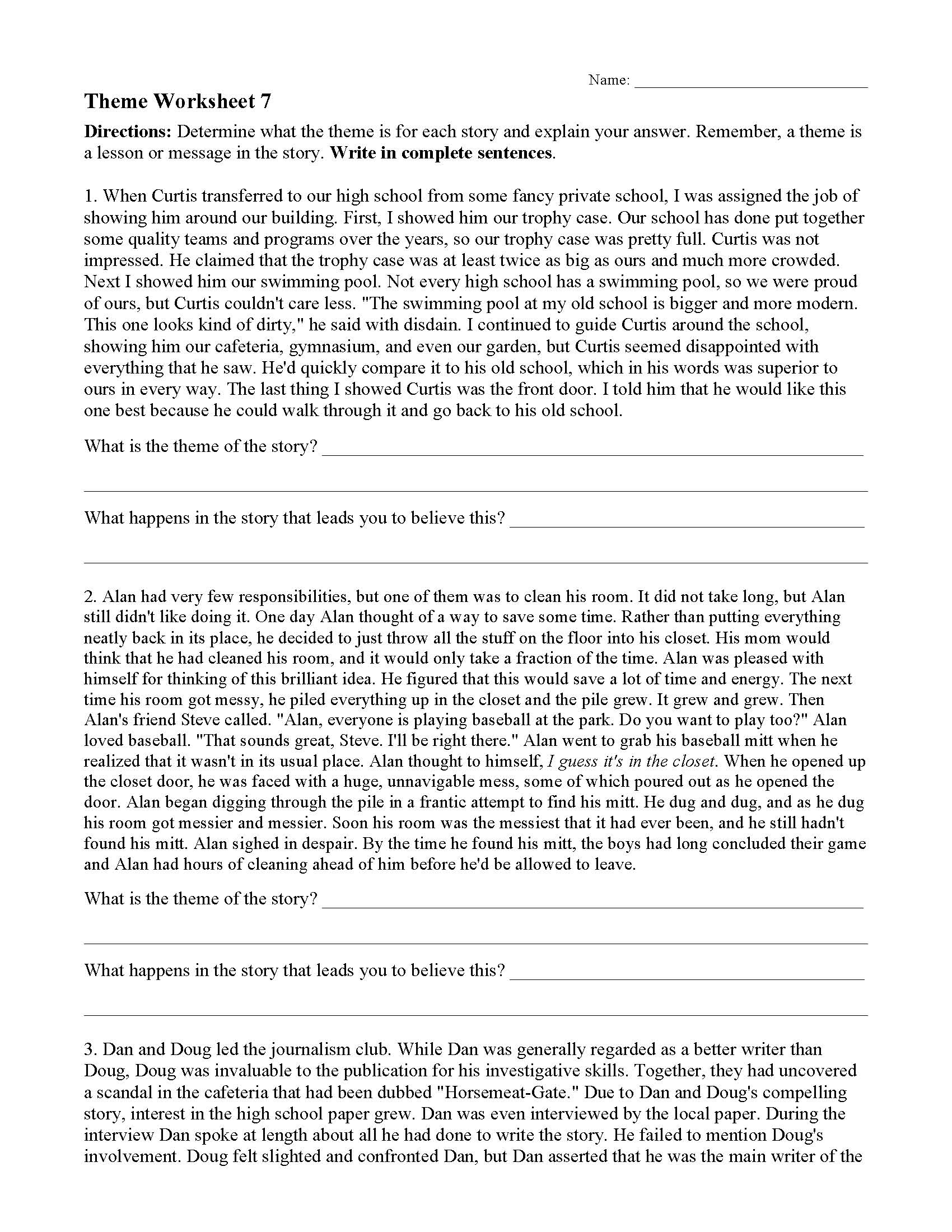
Understanding Theme with Fables 1
This worksheet features classic fables by Aesop. I have removed the explicitly stated morals. Students must draw conclusions to infer the meaning or theme of the fables. This worksheet is 4-pages and has 15 problems. Suggested reading level for this text: Grade 4-8.
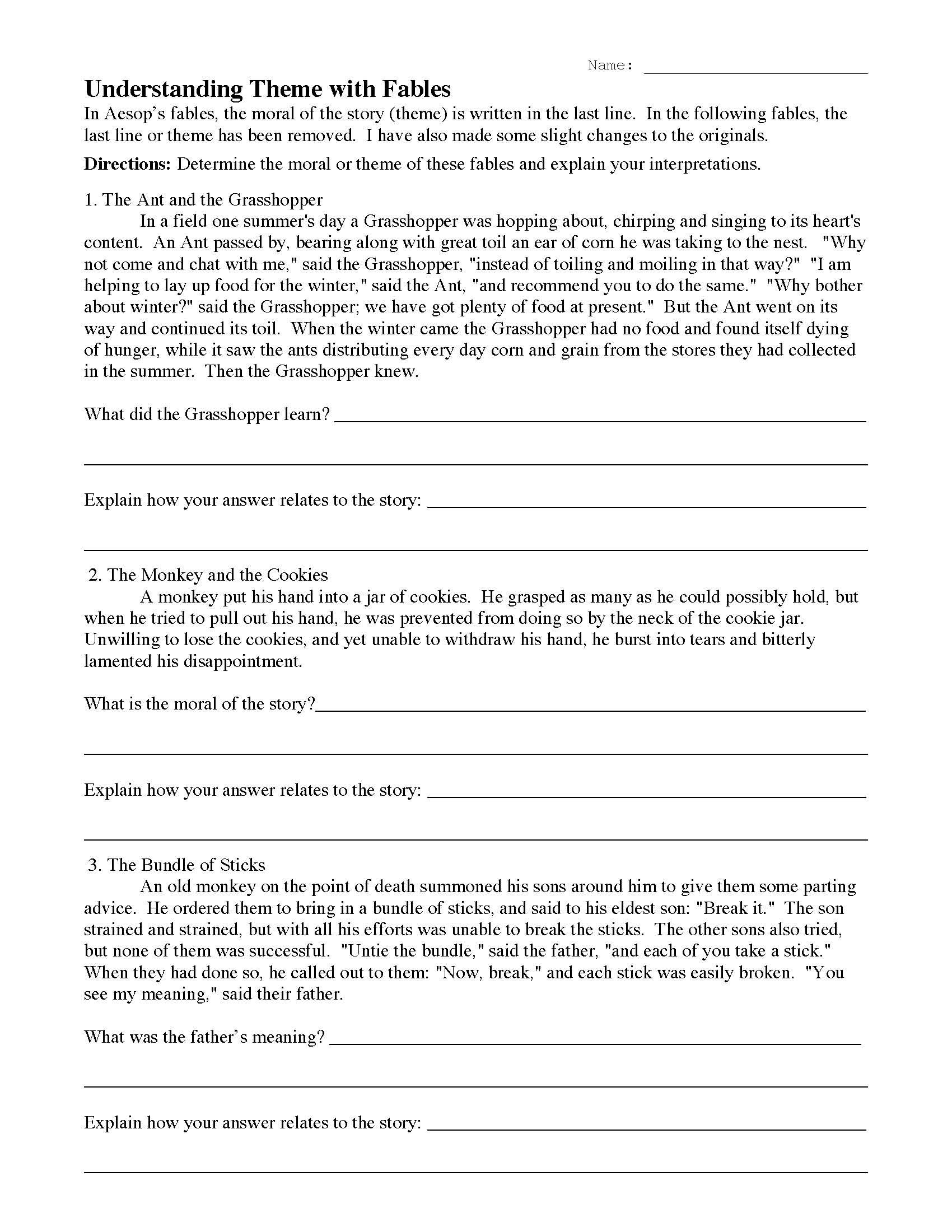
Understanding Theme with Fables 2
Here is another theme worksheet featuring classic fables by Aesop. Once again I have removed the explicitly stated morals. Students should read the fables and draw conclusions to infer the meaning or theme. This worksheet is 2 pages and has 5 problems. Suggested reading level for this text: Grade 4-8.
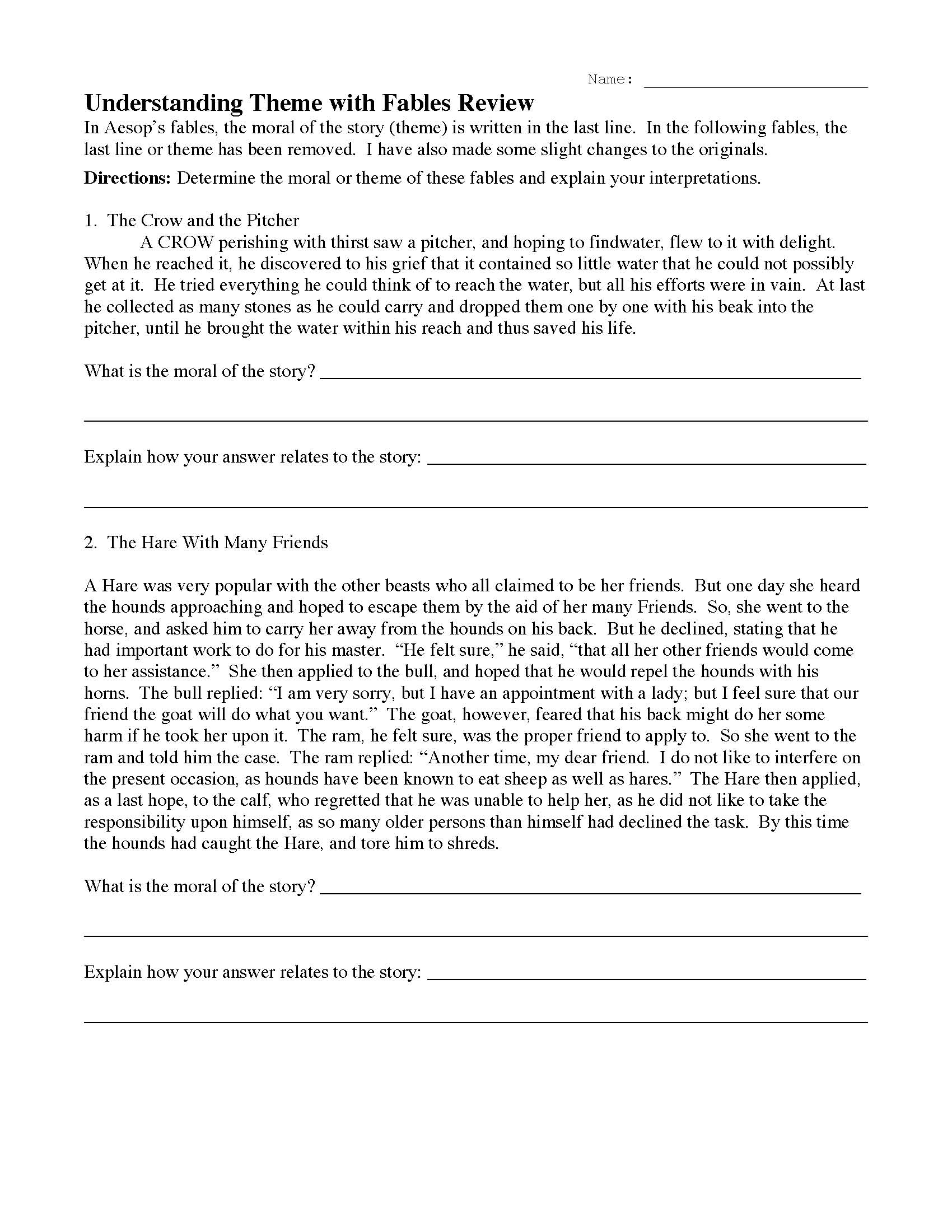
I hope that these theme resources help students meet learning goals.

Good readers can infer the author's theme or message.
Theme
Common Core State Standards
Theme Anchor Standard
R.2 - Determine central ideas or themes of a text and analyze their development; summarize the key supporting details and ideas.RL.1.2 - Retell stories, including key details, and demonstrate understanding of their central message or lesson.
RL.2.2 - Recount stories, including fables and folktales from diverse cultures, and determine their central message, lesson, or moral.
RL.3.2 - Recount stories, including fables, folktales, and myths from diverse cultures; determine the central message, lesson, or moral and explain how it is conveyed through key details in the text.
RL.4.2 - Determine a theme of a story, drama, or poem from details in the text; summarize the text.
RL.5.2 - Determine a theme of a story, drama, or poem from details in the text, including how characters in a story or drama respond to challenges or how the speaker in a poem reflects upon a topic; summarize the text.
RL.6.2 - Determine a theme or central idea of a text and how it is conveyed through particular details; provide a summary of the text distinct from personal opinions or judgments.
RL.7.2 - Determine a theme or central idea of a text and analyze its development over the course of the text; provide an objective summary of the text.
RL.8.2 - Determine a theme or central idea of a text and analyze its development over the course of the text, including its relationship to the characters, setting, and plot; provide an objective summary of the text.
RL.9-10.2 - Determine a theme or central idea of a text and analyze in detail its development over the course of the text, including how it emerges and is shaped and refined by specific details; provide an objective summary of the text.
RL.11-12.2 - Determine two or more themes or central ideas of a text and analyze their development over the course of the text, including how they interact and build on one another to produce a complex account; provide an objective summary of the text.
Click to VIEW Grade Level Standards for R.2
Still looking for something?
Search here.
Search here.
Leave a comment
188 Comments
Leave a Reply
By Using This Website You Agree to the Terms of Use and are aware of our privacy policy.
Subscribe Now
Get emails about new stuff.
Don't worry. I hate spam too.
Some Other Useful Pages
- Author's Purpose Worksheets
- Characterization Worksheets
- Conflict Worksheets
- Fact and Opinion Worksheets
- Figurative Language Activities
- Figurative Language Poems with Questions
- Genre Activities
- Irony Worksheets
- Making Predictions
- Mood Worksheets
- Nonfiction Passages and Functional Texts
- Parts of Speech Worksheets
- Poetic Devices
- Point of View Worksheets
- School Project Ideas
- Setting Worksheets
- Simile and Metaphor Worksheets
- Story Structure Worksheets
- Text Structure Worksheets
- Theme Worksheets
- Tone Worksheets
- ALL PAGES AND WORKSHEETS
Search This Site





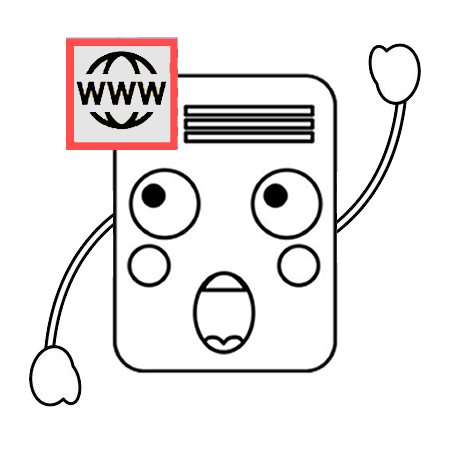

Nina Mann
/ September 25, 2015thanks, very helpful
jamya
/ March 23, 2015it helps alot
jakayla nalls
/ March 7, 2015I learned how to do a theme in the fourth grade it helps me get my grades better and helps me do theme better
Martin
/ February 18, 2015Your site is a fantastic resource! Like most other ELA teachers these days, I am teaching to students with reading levels varying between 2nd grade and 12th grade in the same room (English I – high school), including 5-10 students with SPED modifications in each class. The varying levels and reasonable (yet rigorous) lengths of these materials have made my life much easier. I am exceedingly grateful to you!
DJamison
/ January 27, 2015These are wonderful worksheets! My son doesn’t like rarely likes practice and studying but reading your stories and checking his own answers online is empowering. Furthermore, your definition is exactly the same as the one our ELA teacher has given in the children’s notebooks. My child is in 5th grade in NJ.
Thanks we Loved the PPT’s too1
Mr. Morton
/ March 2, 2015Thank you for your thoughtful feedback. Best wishes to you and your child.
Amy
/ January 23, 2015A lesson on theme with poetry would be sweet!
nada
/ January 8, 2015this website is very useful.
Shavawn
/ January 5, 2015Thank you so much Mr. Morton!
I concur with the other posters: The time you are spending to provide and more importantly, SHARE is much appreciated. Your site has been my go-to site for a number of years.
With regard to the “classical” definition of THEME: I teach theme as a STATEMENT not a single word. Single words, to me, refer to TOPICS not MESSAGES. I agree, this is a bone of contention among the teachers of English community; resulting in perpetual confusion for our students.
I also reference my “go-to” personal investment of the Reader’s Handbook, a Houghton-Mifflin imprint. Their definition of THEME is consistent with yours. In closing, Happy New Year! Thank you, again!!!!
Mr. Morton
/ January 5, 2015Thanks for taking the time to comment.
I appreciate your contribution.
Terry
/ November 30, 2014My most heartfelt thanks!! My students are struggling with theme, so I backed up and did some more inferring. Think we are ready to move forward. I just found this, and am so excited!!! Great stuff! How generous you are for sharing. Thank you, thank you! Have you ever considered putting your stuff on TpT? You could make some money, and your stuff is as good, if not better than tons of materials on there–minus the overly done cutesy graphics! lol
Mr. Morton
/ December 3, 2014Thank you for the comments and advice.
I have considered using TPT, but I am happy just developing this site.
Best wishes and thanks again!
Linsey McCarthy
/ October 28, 2014Thank you so much for this valuable website. I have been looking for alternative resources for when my students don’t “get it”, and this is by far one of the better resources on the internet! I agree that a theme is not just a word, but what the author is trying to say about that word. I use songs for examples, and just how many songs about love exist for different reasons. I also have them use the Universal Themes as a start, with a prompt (Theme Word) can lead to (fill in the blank), using textual evidence to support it as true for the story and outside the story.
CC
/ October 25, 2014Thank you for sharing your knowledge and information. I can see that you have put a lot of time in preparing your resources. I really appreciate your sharing.
GBoykins
/ October 19, 2014You have saved my life. Im a new teacher and this is my go to source. Thank You!
Mr. Dorsey
/ October 15, 2014Sorry if I already posted a comment. Your worksheets and lessons are spot-on. Thanks!
Mr. Morton
/ March 30, 2017No apologies necessary. I appreciate the comments.
Ali
/ October 5, 2014Great resources,
Thanks so much for sharing and being thorough and not charging us, lol.
Everything seems to be about a dollar these days.
Your approach is refreshing, you are detailed, and it’s very interesting.
Again,
THANKS
Ali B.
Mr. Morton
/ October 6, 2014You are most welcome. I like to pass the buck onto the advertisers. Best wishes!
April
/ October 2, 2014Well done. Glad I came upon your site.
Mr. Morton
/ October 6, 2014I am glad that you did too.
Best wishes!
Mrs. K
/ September 5, 2014Do you have answers to your worksheets? it would be nice to have for my subs or TA.
I might be missing them somewhere –
Thanks!
Mr. Morton
/ September 5, 2014Yes, they are available under most assignments. Click the link that says “View Answers” or “Answers.” Best wishes!
Shepard
/ August 16, 2014Your worksheets and power point are awesome. Can’t wait to use it this week for 4th grade.
Mr. Morton
/ August 16, 2014I’m so happy to hear it. Thanks for visiting and taking the time to comment.
Shepard
/ August 16, 2014Even though the definition on the power point has a discrepancy I did notice the test our students take with our Benchmark test assessments also has the answers listed as a moral or lesson learned verses a one word answer.
Mr. Morton
/ August 16, 2014Yeah, I’ve learned that there’s no consensus on this. The two definitions prevail, which is fine. It’d be nice if there were a Common Core glossary that could resolve issues like this.
Kenana
/ August 16, 2014Hello there. I am a college student in Dubai. I don’t use these lessons for my own benefit. I actually teach my little brother at home whenever he has free time after school. This website is the best so far. I have myself learnt a hundred things that made my English much stronger! I really appreciate your work. You’re Amazing!! Thank you very much.
Mr. Morton
/ August 16, 2014That is fantastic. I’m so happy to help. I’d love to visit your city some day. Best wishes!
imeon
/ July 17, 2014This is A great website.. it’ helpful for my 6th grade class
KimJ
/ April 9, 2014Thanks for the help. I’m glad you invented the wheel for us and we can just use what we need. Any TONE work coming in the future?
Mr. Morton
/ April 21, 2014Yes.
There will be tone and mood content added this summer,
as well as content on conflict.
Sarah
/ March 24, 2014Thank you so much for sharing! I’m excited to try it with my students tomorrow! We are reading To Kill A Mockingbird, and these worksheets will be great practice for them to understand theme.
Mr. Morton
/ April 21, 2014That’s great.
I’m happy to help.
I hope the novel study goes well.
nancy
/ March 1, 2014Thank you so much for letting us access your materials. I teach in Nebraska and so far we have not adopted common core, but our new reading program is based on common core. It is great to find such quality materials that help support and scaffold those skills for our students.
Mrs. Jester
/ January 28, 2014Thank you so much for this lesson on theme. I teach 5th grade in Florida and we are using a curriculum that has the students breaking the story down to find theme, but my kids just weren’t getting it. The whole picture approach was so much better for them and the opportunities to practice and justify their answers was wonderful. Thank you for sharing so that those of us who need the help can “beg, borrow and steal!” I very much appreciated you sharing with us.
Sherri
/ January 20, 2014I am so thankful that I found this site! I was trying to find a solid tool to teach my students the concept and I’ve really managed to do so, thanks to you! Your time and efforts are appreciated.
Stacey
/ January 14, 2014Your theme powerpoint and worksheets are amazing!!! Can you please tell me what theme you are trying to convey in your Starburst story?
Mr. Morton
/ January 14, 2014Something to the effect of “Kindness has it’s limitations,” or that you can’t buy friendship.
Thanks for visiting!
Stacey
/ January 15, 2014Thank you!
Patricia
/ January 8, 2014Just found your materials. Wonderful “stuff.” I will use them for warm-up activities as we begin our intensive study for our state standardized test. Thank you, thank you, thank you.
Mr. Morton
/ January 9, 2014You are most welcome. Best wishes!
Mark Renner
/ December 23, 2013This is a great powerpoint, and is exactly what I have been teaching except much more visually appealing. Nice job!
One question – in your powerpoint would you say the theme would be about friendship has to be a two-way street? Or that you will be happier if you stand up for yourself and not let people walk all over you? I can see both for my students.
Jessica
/ December 4, 2013Great website! I love the way you explain the material.
Jose
/ October 23, 2013Great theme passages.
Jennifer
/ October 14, 2013Thank you so much for these great resources! Your practice sheets provide some of the best practice I have found on the web.
Rosemarie
/ October 14, 2013To J Gleason: Theme is written in sentence form. It should not name the story or characters in the story you are writing about since it is not specific to that story. It can apply to many stories. You are confusing theme with motif, which is usually one word and may be the topic upon which the theme is based.
Diana
/ October 12, 2013I teach 3rd grade and I LOVE the way you explained theme in the ppt.
Thank you!
Ms. Mendoza
/ September 20, 2013Thank you for offering this! The site is excellent!
Kris Langthorp
/ September 18, 2013Thank you for your work on theme, as well as the subjects posted. In regards to theme, I am too am using the definition of theme as a life lesson or moral of the story. I am from Texas and must teach the difference between inferred theme from the topic. I was looking for a short list of themes but was unable to find one. Most list are “topics” and not a sentence. Guess I’ll be compiling that list myself.
Mr. Morton
/ September 28, 2013I’m sorry that I couldn’t be of more help to you. Let me know if you get that list together and I’ll post it here.
M. Valenzuela
/ September 15, 2013Thank you so much for sharing these clear, and very useful well-designed lessons….I am new to working with upper elementary children and you just saved me with much needed ideas I needed being this is just my second week!!
Mr. Morton
/ September 28, 2013You’re going to do great. Best wishes!
Dana
/ September 15, 2013Thanks for the great resources. I’ve been teaching ESL, ELA, and Reading for upwards of ten years. It’s a tough way to make a living nowadays. I commend you for creating this website. Us teacher-types must stick together!!!
Mr. Morton
/ September 28, 2013Yes, it seems to get tougher every year, but maybe that’s just my experience. Anyway, I’m happy to help and I wish you the best.
Amy
/ September 14, 2013I found this site while looking for standardized test practice and lessons for my middle school students. They have really responded to the many opportunities to practice each skill. My superiors are satisfied that I’m giving the students what they need to excel. Thank you so, so much.
Mr. Morton
/ September 28, 2013That’s great to hear. I wish you the best.
Miranda
/ September 10, 2013Love it! I haven’t been able to find much for theme and this is so perfect!
Christine Carvey
/ August 31, 2013Thank you for this resource. It is outstanding and I sincerely appreciate that it is free.
Chanelle Lincoln
/ April 24, 2013I have been a teacher for eight years now, and your site is by far the best resource I have encountered for accurate, quality materials. The creation of all of these tools must have been time-consuming, as I can barely find the time to create what I consider to be quality lessons, grade, complete report cards, and maintain my enthusiasm on a daily basis. I greatly appreciate you not only creating these materials, but also sharing them with the cyber-world. Thank you, ten times over!!!
Mr. Morton
/ May 1, 2013Thank you for saying so. I have so much more content to add and work to do on this site, but I think that you will like what I have in store. Best wishes!
Jenny M
/ March 26, 2013Great job! I’m so thankful I stumbled upon this!
J Gleason
/ March 21, 2013The definition of theme given in this ppt lesson is incorrect. The theme is not the lesson or moral. It is a one-word concept, such as frienship or equality. Themes are universal, while a lesson or moral is specific to a particular story’s plot.
Mr. Morton
/ March 21, 2013Thank you for your input. This is often a point of contention. As you can see from the Wikipedia page about literary theme, there are two conflicting definitions for theme, one of which you list. I respect your views and encourage you to use my materials anyway they assist you.
In my personal case, however, I go by the definition of theme as listed in the ISAT glossary. The ISAT is the test that Illinois students are required to take, and as a teacher in Illinois, I design many of my materials to prepare my students for this test. According to the ISAT glossary,
So, since I function under the terminology put in place under our state framework, perhaps my resources aren’t “incorrect,” but rather different from the framework under which you function.
Thanks for visiting.
awoodahl
/ March 4, 2014I agree with the definition from this powerpoint. I specifically teach that a theme CAN NOT be a single word. Students need to be using their higher order thinking skills to develop a message for mankind, humanity, good or bad, based on the events of the story. They can’t express this with a single word, nor can they really support that with textual evidence.
NHill
/ September 16, 2014I also agree with your take on theme as you have it outlined in the PPT. Your information and lessons have been extremely helpful to me and my students. Thanks for all your hard work and for sharing with others.
Mr. Morton
/ September 18, 2014You are most welcome. Thank your for your concurrence.
Erin
/ May 23, 2013A theme is Not a one word concept. Those are big ideas or universal topics. Themes are the lessons that the author wants us to take away regarding the big idea. Money, love, death, etc. are Not themes.
Sarah
/ October 6, 2013I prefer to to think of those one-word ideas that appear (bravery, love, friendship) as motifs that lead us to themes, the greater message of the piece.
Marie Vazquez
/ March 19, 2013Work on theme a bit more. Worksheets are excellent for structure as well as ppt. I feel very confident using your material. It is solid. Thanks a lot.
Keri
/ March 18, 2013Wow.. Thanks! Theme resources are so hard to find. These are great.
Al
/ March 18, 2013Theme is separate from moral. The theme is the author’s (implied) statement about life. It is the author’s opinion of survival, love, death, or any other societal norm that is experienced. For example, one of the themes of the “Hunger Games” could be that sacrifice is the purest expression of love.
The moral of the story is a lesson that readers can take away from the reading. “The Boy Who Cried Wolf,” for example, has the moral of “You shouldn’t lie because when you are telling the truth, no one will believe you.” So a fable has a moral, not a theme.
Mr. Morton
/ March 21, 2013Hello. I teach in Illinois. We prepare students for the ISAT test. This is the definition of theme according to the ISAT glossary:
Maybe it is different in your state. I see little distinction. In any event, similar skills can be used to identify either. Best wishes!
Lisa
/ March 10, 2013Thanks for sharing!
Sarah
/ February 28, 2013Phenomenal site, the resources are extremely useful.
I shall list this site in my useful learning resources.
Thank you so much for sharing.
Mr. Morton
/ March 3, 2013That’s awfully nice of you! Thanks for visiting.
Jonathan Cole
/ February 27, 2013Great worksheets. Thanks for putting your answer key as well! Do you happen to know of any good strategies where students will create their own themes?
Mr. Morton
/ March 3, 2013Not so much, but I can tell you what I do: I think of the message that I am trying to express first, and then I construct a story that exemplifies this message. Best wishes!
Shawn Lawrence
/ February 25, 2013Great stuff, so helpful. Hard to understand how crass some people are, but you handle it with class. You must be a classy lady.
My two cents: Theme is the message the AUTHOR is trying to get across to the reader.
Mr. Morton
/ March 3, 2013I am a male :D, but I will take your sentiments as a compliment.